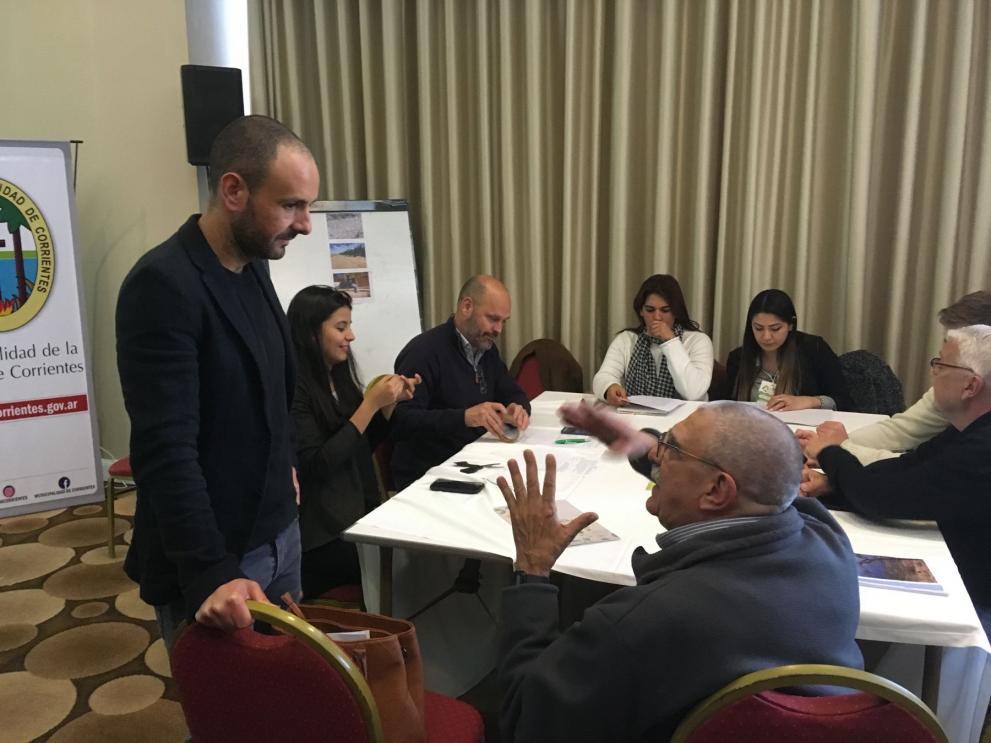
This week JRC experts train local authorities in a workshop on mitigation and adaptation to climate change in Corrientes, Argentina.
The workshop is organised in the frame of the Global Covenant of Mayors – an initiative gathering local authorities from all over the world keen to tackle the climate crisis.
Local authorities will play a key role in the achievement of the EU’s and the Paris Agreement’s energy and climate objectives.
The Global Covenant of Mayors is the largest global alliance for city climate leadership and a shared vision towards a resilient and low emission society.
The Global Covenant originated from the merge of the EU’s own Covenant and the Compact of Mayors, and promotes and supports voluntary commitments to action from local authorities.
The Global Covenant helps local authorities worldwide to translate their commitments into action, through the implementation of Sustainable Energy and Climate Action Plans (SECAPs), while taking into account their diverse needs.
The European Commission’s Joint Research Centre (JRC) provides scientific and technical support to the Global Covenant of Mayors.
The JRC is in charge of ensuring the scientific quality of the initiative by:
- developing methodologies regionally adapted for the Sustainable Energy and Climate Action Plans implementation;
- evaluating the SECAPs and providing a complete feedback to the participating cities, highlighting the strong points and weaknesses of their plans;
- supporting local authorities in designing and implementing their plans by providing training to local actors and stakeholders through technical workshops;
- assessing the overall impact of the initiative worldwide.
Methodological adaptation: guidebooks
The guidance material, prepared by the European Commission with the support and input of many experts from municipalities, regional authorities and other agencies or private companies, offers a set of methodological principles and a harmonised data compilation and reporting framework, under the Global Covenant’s “Common Reporting Framework”.
The JRC prepares guidebooks for the different regions of the world, taking into consideration their differences under a single harmonisation umbrella.
The aim of the guidebooks is to help local authorities prepare action plans to reach committed targets.
Workshops and trainings
The JRC is responsible for training experts, local actors and stakeholders involved in the initiative.
During the workshops, the JRC provides cities’ delegates with materials, tools and hands-on exercises focusing on the three pillars of the initiative: mitigation, adaptation and energy access.
Apart from the trainings in Argentina, on 25-27 September the JRC will conduct the experts’ consultation on the first Covenant guidebook for Latin America taking place in Cartagena de Indias, Colombia.

Background
The Global Covenant of Mayors for Climate & Energy (Global Covenant) formally brings together the Covenant of Mayors and the Compact of Mayors, the world's two primary initiatives of cities and local governments to advance their transition to a low emission and climate resilient economy and to demonstrate their global impact.
The Global Covenant is governed by a Board of Directors co-chaired by Michael Bloomberg and Commission Vice-President Maroš Šefčovič, and includes mayors from across the world.
Inspired by the models of the Covenant of Mayors and the Compact of Mayors, but adjusted to local circumstances, priorities and expertise, Covenant signatories are supported by Regional Covenant Secretariats.
Currently, the European Commission supports secretariats covering the European Union, East and South neighbouring countries of the EU, Sub-Saharan Africa, North America, Latin America and the Caribbean, China and South-East Asia, India and Japan, Australia.
Other countries are supported by the Global Secretariat, financed by Bloomberg Philanthropies.
In Europe, the EU Covenant of Mayors is firmly embedded in the EU’s climate and energy policies, and signatory cities will contribute significantly to the implementation of the EU’s 2030 climate and energy package and of the EU Strategy on adaptation to climate change.
Since its launch in 2008, the EU Covenant of Mayors has mobilised more than 9,000 cities to set ambitious targets and to act on reducing CO2 emissions, and more than 1,000 cities have also committed to developing and implementing adaptation actions.
These numbers are growing.
Collectively Covenant of Mayors signatory cities have committed to reducing their CO2 emissions by 27% by 2020 - that is a target 7 percentage points higher than the EU target, and they are well on track to reach that goal.
Related Content
Latest JRC publications:
Covenant of Mayors: Local energy generation, methodology, policies and good practice examples
Guidebook: How to develop a Sustainable Energy and Climate Action Plan
Details
- Publication date
- 23 August 2019
